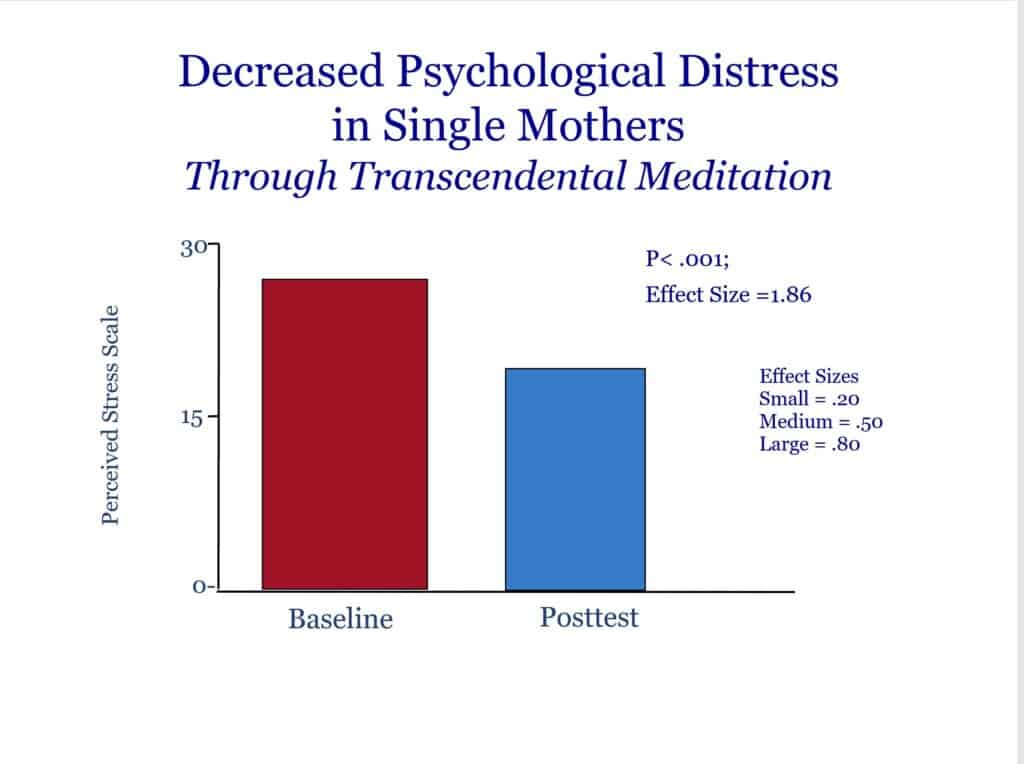“When I look back to all [the violence] I went through it is truly a miracle I am alive. To learn TM has been like a life-changing experience. I now feel hopeful. Life that had been grey for so long came back to colours.”
—Mother and Victim of Domestic Violence
We are currently looking for funding for at-risk-single mothers in the Vancouver area to learn the TM program. Click here if you would like to support this project with a tax-deductible donation.
At-Risk Families: Overcoming Traumatic Stress
Poverty and domestic violence is an ever-present problem and can seriously affect the well-being of families. Recent statistics show that nearly 5 million Canadians live in poverty, and more than 200 people are reported as victims of family violence every day. Family violence is considered to be any form of abuse, mistreatment or neglect that a child or adult experiences from a family member, or from someone with whom they have a domestic relationship—victims of family violence experience extreme mental, physical and emotional distress, poor health and low self-esteem. Poverty and family violence are considered major public health issues in Canada.
By the Numbers
Poverty
• Poverty costs Canada billions of dollar annually.
• Precarious employment has increased by nearly 50% over the past two decades.
• In recent decades, the average earnings among the least wealthy Canadians have fallen by 20%.
• Over the past 25 years, Canada’s population has increased by 30%, and yet annual national investment in housing has decreased by 46%.
Violence
• An average of 172 homicides is committed every year by a family member.
• For approximately 85,000 victims of violent crimes, the person responsible for the crime was a family member.
• Just under 9 million, or about one in three Canadians, said they had experienced abuse before the age of fifteen.
• Just under 760,000 Canadians said they had experienced unhealthy spousal conflict, abuse or violence in the previous five years.
• More than 766,000 older Canadians said they had experienced abuse or neglect in the previous year.
• Women and children are among those groups most likely to experience violence in the home.
• Family violence and poverty have extensive and persistent effects on an individual’s physical, mental and emotional health. These effects range from depression, Post-Traumatic Stress Disorder and anxiety to physical health issues such as injuries and vulnerability to disease.
• Research has shown that TM can significantly reduce stress levels, including symptoms of PTSD; assist a person in developing resilience and recovering more quickly from stressful situations; help to improve relationships, and be a useful tool in decreasing alcohol and substance misuse. Transcendental Meditation also improves mental clarity, self-efficacy, and brings about a sense of empowerment.
• Working alone or in conjunction with other programs, the TM technique can help bring harmony to the family and a sense of well-being and empowerment to individuals.
Transcendental Meditation is:
- Evidence-based—over 675 scientific studies; 406 have been published in independent, peer-reviewed journals or other edited scientific publications;
- Simple to learn—standardized instruction ensures consistent results;
- Easy to practise—does not involve concentration or controlling the mind;
- Confidential and portable—can be practised privately, anywhere, at any time.
Benefits of the regular practice of the TM technique include:
- Reduced symptoms of PTSD and depression;
- Reduced anger and hostility;
- Decreased reliance on alcohol;
- Reduction in high blood pressure;
- Reduction in high cortisol levels;
- Increased resilience;
- Decreased perceived stress.
Our Work with At-Risk Families
Vancouver YWCA: Program for Single Mothers
In February of 2019, the Canadian Women for Wellness Initiative began a collaboration with the YWCA in Vancouver to teach the TM technique to women in the Y’s single mother’s support program. The project was organized by certified TM teacher Deboragh Varnel who did the instruction and administered the pre- and post-test for perceived stress. CWWI provided the funding for teaching the women, and the YWCA provided the space for teaching, and daycare for the children while their mothers were in class. The project stopped in 2020 and the first half of 2021 due to COVID, but in the past year we have brought TM to 45 women and will continue into 2023.
Results: the participants are administered the Sheldon Cohen Perceived Stress scale before learning TM and after three months of practice. Results indicated that the practice of the TM program had a significant effect in reducing perceived stress. Baseline perceived stress, prior to training in TM, showed a mean of 26.27 (SD=4.17) with a post-test mean of 18.64 (SD=3.98); p=.001). The effect size was large (ES=1.86). These results are consistent with previous research on TM, indicating reduced stress and improved mental health.

